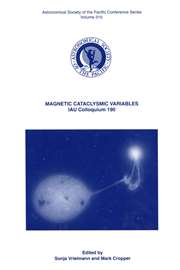No CrossRef data available.
Article contents
Disks Around T Tauri Stars
Published online by Cambridge University Press: 12 April 2016
Abstract
A variety of evidence suggests that at least 50% of T Tauri stars are surrounded by disks of gas and dust. Inferred disk properties are compatible with those generally attributed to the solar nebula, before the formation of planets. Millimeter-wave aperture synthesis mapping of molecular line and dust continuum emission from T Tauri stars provides a direct way to ascertain if disks are present. The technique enables detailed studies of disk temperature and density distributions, chemical properties and velocity fields. These results inform our understanding of both star formation and solar system evolution. We review the observations to date and discuss directions for future research.
Information
- Type
- 3. Astronomical Results and Prospects
- Information
- Copyright
- Copyright © Astronomical Society of the Pacific 1994

